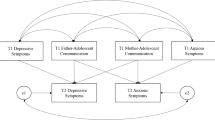Abstract
The present study offered an initial investigation into parent–child communication about interparental conflict and its relation to children’s psychological functioning. Seventy-five predominantly African-American children ages 6–12 and their mothers were interviewed. Children listened to an unresolved interparental conflict and answered questions regarding the frequency and content of mother–child communication as if the conflict had occurred in their home. Descriptives of mother-and child-initiated discussions were provided in detail. Children who expected mothers to initiate discussions about interparental conflict with them were in turn more likely to initiate discussions with their mothers. Surprisingly, less than half of mothers were reported by children to communicate in a validating manner, and an equal number of children expected their mothers to communicate in an invalidating manner. Findings demonstrated significant relations between the content of mother–child communication (i.e., validation, invalidation) and children’s adjustment (e.g., externalizing problems, depression). Future directions are discussed with an emphasis on the importance of further “process-oriented” research.
Similar content being viewed by others
References
Achenbach, T. (1991). Manual for the child behavior checklist/4-18 and 1991 profile. Burlington, VT: University of Vermont, Department of Psychiatry.
Cummings, E. M., Ballard, M., El-Sheikh, M., & Lake, M. (1991). Resolution and children’s responses to interadult anger. Developmental Psychology, 27, 462–470.
Cummings, E. M., & Davies, P. T. (2002). Effects of marital conflict on children: Recent advances and emerging themes in process-oriented research. Journal of Child Psychology & Psychiatry & Allied Disciplines, 43, 31–63.
Cummings, E. M., Goeke-Morey, M. C., & Papp, L. M. (2004). Everyday marital conflict and child aggression. Journal of Abnormal Child Psychology, 32, 191–202.
Davies, P. T., & Cummings, E. M. (1994). Marital conflict and child adjustment: An emotional security hypothesis. Psychological Bulletin, 116, 387–411.
Davies, P. T., & Cummings, E. M. (1998). Exploring children’s emotional security as a mediatory of the link between marital relations and child adjustment. Child Development, 69, 124–139.
Davies, P. T., Harold, G. T., Goeke-Morey, M. C., & Cummings, E. M. (2002). Child emotional security and interparental conflict. Monographs of the Society for Research in Child Development, 67 (3, Serial No. 270).
Davies, P. T., Myers, R. L., & Cummings, E. M. (1996). Responses of children and adolescents to marital conflict scenarios as a function of the emotionality of conflict endings. Merrill-Palmer Quarterly, 42, 1–21.
Davies, P. T., Myers, R. L., Cummings, E. M., & Heindel, S. (1999). Adult conflict history and children’s subsequent responses to conflict: An experimental test. Journal of Family Psychology, 13, 610–628.
Eisenberg, N., Cumberland, A., & Spinrad, T. L. (1998). Parental socialization of emotion. Psychological Inquiry, 9, 241–273.
Eisenberg, N., Fabes, R. A., & Murphy, B. C. (1996). Parents’ reactions to children’s negative emotions: Relations to children’s social competence and comforting behavior. Child Development, 67, 2227–2247.
Emery, R. E., Fincham, F. D., & Cummings, E. M. (1992). Parenting in context: Systemic thinking about parental conflict and its influence on children. Journal of Consulting & Clinical Psychology, 60, 909–912.
Fincham, F. D., & Osborne, L. N. (1993). Marital conflict and children: Retrospect and prospect. Clinical Psychology Review, 13, 75–88.
Gottman, J. M., Fainsilber-Katz, L., & Hooven, C. (1996). Parental meta-emotion philosophy and the emotional life of families: Theoretical models and preliminary data. Journal of Family Psychology, 10, 243–268.
Grych, J. H., & Fincham, F. D. (1990). Marital conflict and children’s adjustment: A cognitive-contextual framework. Psychological Bulletin, 108, 267–290.
Jacob, T., & Johnson, S. L. (1997). Parent–child interaction among depressed fathers and mothers: Impact on child functioning. Journal of Family Psychology, 11, 391–409.
Jenkins, J. M., & Smith, M. A. (1991). Marital disharmony and children’s behaviour problems: Aspects of a poor marriage that affect children adversely. Journal of Child Psychology & Psychiatry, 32, 793–810.
Katz, L. F., & Gottman, J. M. (1997). Buffering children from marital conflict and dissolution. Journal of Clinical Child Psychology, 26, 157–171.
Kovacs, M. (1992). Children’s depression inventory. New York, NY: Multi-Health Systems.
Rogers, M. J., & Holmbeck, G. N. (1997). Effects of interparental aggression on children’s adjustment: The moderating role of cognitive appraisal and coping. Journal of Family Psychology, 11, 125–130.
Saylor, C. F., Finch, A. J., Spirito, A., & Bennett, B. (1984). The children’s depression inventory: A systematic evaluation of psychometric properties. Journal of Consulting and Clinical Psychology, 52, 955–967.
Shipman, K. (2000). Emotion management interview—spousal conflict. Unpublished measure.
Shipman, K., & Fitzgerald, M. M. (2005). A family-focused emotion communication training module (AFFECT). Presented at the Emotions and Emotional Development Pre-Conference biennial meeting of the Society for Research on Child Development, Atlanta, GA.
Sillars, A., Canary, D. J., & Tafoya, M. (2004). Communication, conflict, and the quality of family relationships. In A. L. Vangelisti (Ed.), Handbook of family communication (pp. 413–446). Mahwah, NJ: Lawrence Erlbaum Associates.
Stocker, C. M., & Youngblade, L. (1999). Marital conflict and parental hostility: Links with children’s sibling and peer relationships. Journal of Family Psychology, 13, 598–609.
Author information
Authors and Affiliations
Corresponding author
Rights and permissions
About this article
Cite this article
Brown, A.M., Fitzgerald, M.M., Shipman, K. et al. Children’s Expectations Of Parent–Child Communication Following Interparental Conflict: Do Parents Talk to Children About Conflict?. J Fam Viol 22, 407–412 (2007). https://doi.org/10.1007/s10896-007-9095-x
Published:
Issue Date:
DOI: https://doi.org/10.1007/s10896-007-9095-x




